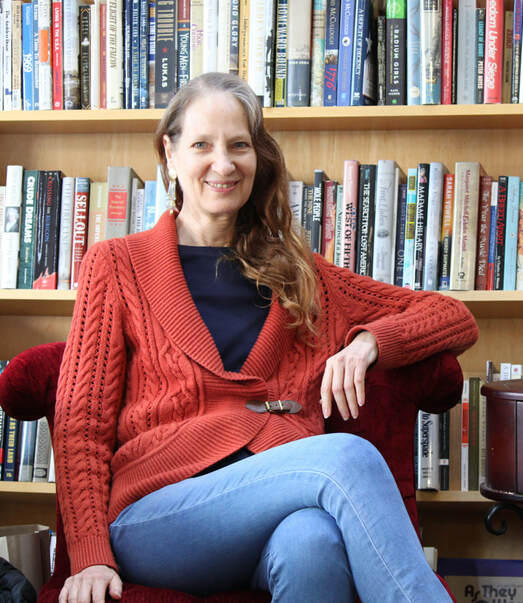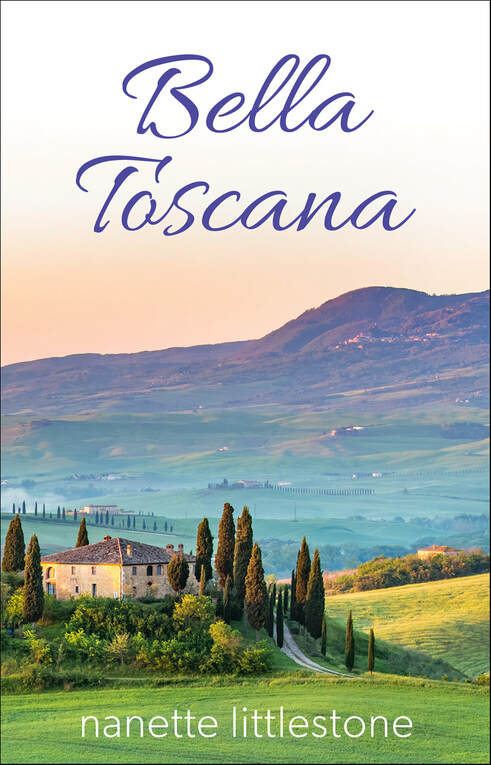 Nanette Littlestone is an award-winning author, editor, publisher, and CEO of Words of Passion. Nanette never knew she wanted to be a writer until she was over forty. But once she began, the ideas didn't stop. She loves to explore relationships and is unceasingly curious about why people do what they do. The themes of her stories focus on love (what we always strive for) and forgiveness (what we always need). Authentic writing comes not from the mind but from the heart. When you embrace your vulnerability, that’s when you truly connect with your readers. A huge fan of food and cooking, Nanette acts as the master chef. Sometimes writing thrills and lifts the soul. Sometimes it’s a lot like chocolate—temperamental. With over 25 years of experience guiding authors to achieve more clarity and authenticity in their writing, Nanette shows you how to turn the elements of your story into a mouth-watering delight. A story that comes from the heart and inspires others. Her books include F.A.I.T.H. - Finding Answers in the Heart, Volumes I and II, the historical novel The Sacred Flame, and the contemporary sequel Bella Toscana. And a new book is in the works, a YA fantasy about healing the heart of the planet. In her spare time, she works with the Conscious Life Journal as Editor in Chief, managing authors and articles for this magazine that helps people journey into higher conscious awareness through the five stages of Mind, Body, Spirit, Integration, and Balance. When I was in high school, my mother suggested that I write stories. She might as well have suggested I be an astronaut. (There were no women in the space program then.) I loved to read voraciously, but writing was an unimaginable concept surrounded by an enormous black void. Sometimes creativity needs forceful encouragement. Fast forward to 1994. I still loved to read. One sunny Saturday afternoon I was sitting on my futon in my bedroom minding my own business when I heard my name. Just my name. No neon sign or burning bush or ferocious clap of thunder. When nothing else happened, I shrugged and let it go. The following week the same thing happened. Ticked off, I yelled, “What? What do you want?” And again, there were no visible signs. But this time I felt a knowing, a sense that I was supposed to write. So I began. I wrote my first novel by hand in nine months. The second novel took less than three months. The third novel took several years. And so on. When I moved to Atlanta in 2002, I committed to a writing career and joined a critique group. I’d never read my writing in public and it was disastrous. I do believe that everyone said something positive, but everyone also said something negative. And, of course, I focused on the negative. After the third person’s critique, my head swam, my eyes blurred, and I couldn’t hear a thing. When the meeting ended I ran to my car and swore I wouldn’t come back. Ever. Two weeks later I returned to the group. The best decision I could have made. Six months later I became the new leader. I continued to write novels but something was missing. A lot, actually. I couldn’t plot worth a darn. All the books I read seemed to come together effortlessly. How did the authors do that? At long last help arrived in the form of a class on plotting. I was working on my historical novel (The Sacred Flame) about a Vestal Virgin and all the love scenes were written but how did I connect them? When the teacher introduced the concept of GMC (Goal, Motivation, and Conflict) I felt an ember glow. We filled out a chart for our major characters with their default behavior, inner motivation, outer and inner goals, and outer and inner conflict. We talked about their wants, their needs, their fears. And over all of this, the teacher told us to use the character’s default behavior to create conflict. Huh? I just didn’t get it. I struggled through the entire class. Every week we would build on the previous week, but the conflict in my story would not gel. Slippery as egg whites, that stuff. In the last week, when I’d run out of hope, another student asked the same question about default behavior and conflict. And suddenly the ember caught flame and began to blaze. If my heroine followed the rules, what could make her do the opposite? If my hero wanted his father’s respect, what would cause his father to reject him? Such a simple strategy when you understand how it works. That revelation blasted open the doors to my creativity and Spirit rejoiced. I had such fun developing untenable situations for my characters, pitting them against each other, creating misunderstandings and slights and jealousy and betrayal, and also finding hope and compassion and forgiveness and love. Since The Sacred Flame, in all my writing and professional editing, I require myself and my clients to fill out a GMC chart. I love to explore relationships and want to know why people do what they do. I want to read about the emotional side of the characters—how do they think, how do they feel, why do they make the decisions they make? I write stories about women because I am a woman and my path in life is challenging and mysterious and enchanting. The more I honor myself with love and respect and compassion, the more I open the way to the bounty the universe is waiting to bestow. So the themes in my stories focus on love (what we always strive for) and forgiveness (what we always need). The theme in The Sacred Flame explores what people would sacrifice for love. The theme in Bella Toscana, the sequel to The Sacred Flame, looks at having the courage to follow your heart. The new story I’m working on, which involves an 18-year-old heroine (Help!, I’ve never written a teen story before), is about healing old pain and fear through love and acceptance. Writing is one of the most thrilling things that I do. When inspiration beckons and the words flow, it’s almost as good as the satisfaction that comes from eating rich dark chocolate. Or maybe better, because the bliss from writing is beneficial for mind, body, and spirit. I’d love to meet Nora Roberts to thank her for inspiring me. Her ability to pack so much into one or two words helped me hone my skill. And I would love to chat with Susan Meissner and Kristin Hannah about story development and research. Their writing is sensitive and heartfelt and so emotionally impressive. Bella Toscana An explosive yearning that can’t be denied. Disturbing visions from an ancient past. A mysterious stranger that somehow feels familiar. On the night of her fiftieth birthday, the comfortable ride of Toscana’s life takes an alarming plunge. Haunted by seductive visions, she tries to push aside the desire and focus on the husband who adores her. Then she falls for Flynn, a younger man with an eye for adventure and a heart full of romance, who leaves her doubting everything she’s believed about love and passion. In Atlanta, Rome, and the lush scenery of Tuscany, Toscana searches for answers to the mysteries of her life while she faces her biggest question. If she listens to her feelings will she lose everything she holds dear, or does her heart hold the key to love and joy? Find Nanette on her website, Goodreads and Facebook! Where to Buy Bella Toscana
0 Comments
Leave a Reply. |
AuthorI'm generally pulled in a million different directions and I wouldn't trade it for the world. Here's a glimpse of my life - hope you enjoy it! And if there's a big lapse between posts, well, that's the way life goes in Amy's world. Archives
October 2022
Categories
All
|
|
Copyright 2024 by Amy Rivers. All rights reserved. |
 RSS Feed
RSS Feed